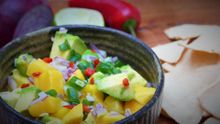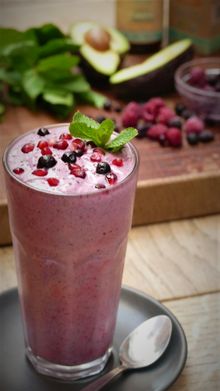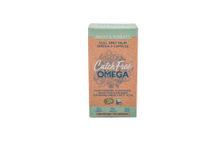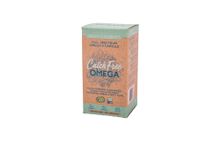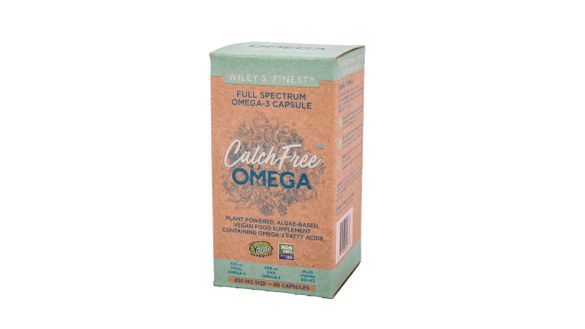 16 Jul 2020
16 Jul 2020
Tags: Wiley's Finest, CatchFree Omega, Omega-3

A major step forward for plant-based consumers, CatchFree Omega – Full spectrum Omega-3 Liquid is the first health supplement in the world that not only offers vegans and vegetarians their daily dose of Omega-3s, vitamin D and vitamin K2 from plant-based sources, but can also be used as an ingredient to create delicious meals such as desserts, smoothies and salads.
Omega-3s are crucial for brain, heart, eye, and reproductive health. They optimise our brain function; improving focus, IQ and memory. They also have anti-inflammatory effects and have been shown to reduce the chance of dementia. Yet studies show most of the UK population, and especially vegans, vegetarians, and flexitarians are commonly deficient in Omega-3s.
CatchFree Omega – Full spectrum Omega-3 Liquid and soft gel capsules are made from a blend of branded British-grown Ahiflower seed oil, Algarithm DHA derived from marine algae and the addition of MenaQ7 vitamin K2 and Vitashine vitamin D3.
Naturally wild and now agriculturally grown, British Ahiflower contains a full spectrum of healthy fats such as ALA Omega-3, SDA Omega-3, and GLA Omega-6 fatty acids. Each bloom of the Ahiflower produces up to four seeds which are then pressed to produce an Omega-rich healthy oil with a higher quality and quantity of Omegas than any other seed oil ever produced.
The light Tropical Mango flavouring of CatchFree Omega – Full spectrum Omega-3 Liquid makes it truly unique in that consumers can conveniently cook with it.
Nutritionist Pauline Cox MSc BSc and author of the newly launched health and recipe book, “Primal Living in a Modern World” has created several recipes with Catch Free Omega – Full Spectrum Omega-3 Liquid such as Brain-Boosting Chocolate Truffles, Holy Gua-ahi-mole, an Energizer Smoothie, a Totally Tropical Chia Pudding for breakfast or dessert and a Mango, Spinach and Mint ice pop.
Pauline Cox says: “I love cooking with CatchFree Omega. It's a convenient, delicious and healthy way to cook to ensure my family is getting its daily dose of Omega-3s. More people than ever are taking steps to improve both personal and environmental health by reducing or eliminating animal-based foods, yet there is a risk of missing essential fats. Fortunately, CatchFree Omega – Full spectrum Omega-3 Liquid is now available to meet these needs.”
Vegans, vegetarians, and flexitarians are commonly deficient in the essential nutrient, omega-3. DHA omega-3 is crucial for brain, heart, eye, and reproductive health. Doctors recommend consuming 250-500 mg per day. Even vegetarians who eat eggs and dairy foods, their intake is, on average, only 20 mg DHA per day compared to the suggested. A large population study in vegetarians reported that more than half of the subjects consumed no DHA at all.
Wiley's Finest has continued to expand beyond wild Alaskan fish oils by launching other plant-based products such as Bold Heart, a useful and natural way to manage cholesterol in a convenient, mixable sachet serving for heart health on-the-go.
"From day one, Wiley's Finest was always designed to offer more than 'just' exceptional quality fish oil. We are passionate about the essential fatty acid category, and about our mission to serve the health and nutrition needs of all consumers. We recognise there are millions around the world who choose not to eat animal products, and our commitment to serve the health of everyone on the planet has just taken a major step forward." says Sam Wiley, Wiley's Finest CEO.
CatchFree Omega – Full spectrum Omega-3 Liquid and Capsules are certified non-GMO by NSF and Vegan by the Vegetarian Society.
It is available for home delivery at the recommended retail price of £29.99 for either 60 softgel capsules (2 months' supply) or 125ml of delicious mango-flavoured liquid. It is available online and from independent health food shops and pharmacists across the UK.
For more information please contact:
Jo O'Connell
JellyRock PR
07977 714 787
-
What are Omega-3s?
Gretchen Vannice has a Master's in Nutrition Science and is a registered dietitian nutritionist, specializing in omega-3 research. She is also author of Making Sense of Omega-3s: The Good Fats. She specialises in omega-3 research and natural health. She says:
“Both omega-3s and omega-6s are required fats in human health. They're called essential fats because we need them but our bodies can't make them; instead, we must consume them through diet and supplements. Most of us get plenty of omega-6s but fall short of enough omega-3s.
“Omega-3s are among the most researched nutrients. Different forms and sources of omega-3s exist (see Table) and they work differently in the body. For example, ALA and SDA omega-3s found in plant oils work differently from EPA and DHA omega-3s found in algae (vegan) and fish oils. What's more, while all omega-3s have health benefits, research shows that some give more targeted benefits in our bodies.
“The omega-3s EPA and DHA support life-sustaining functions, such as breathing, heart rate, and muscle and nerve contractions. Everyone needs EPA and DHA for a healthy body, and higher levels of omega-3 (measured as the Omega-3 Index) support optimum health. An Omega-3 Index of 8% or higher improves the health of your brain, heart, eyes, joints; it increases longevity and supports overall health and wellness.
“ALA and SDA are also healthy fats; they are great sources of energy and support general metabolic wellness. Supplementing with SDA and vegan DHA omega-3s effectively increases the Omega-3 Index.1,[i] Both ALA and SDA can convert to EPA in our bodies; the added benefit of SDA is that the body turns SDA into EPA far more efficiently than ALA does from flax seeds.[ii],[iii],[iv],[v] Research shows that consuming vegan DHA increases DHA levels, while consuming ALA will not.[vi],[vii],13
“All of us, from vegan to omnivore, need DHA omega-3 for optimal health as it is crucial for brain, heart, eye, and reproductive health. The majority of us don't meet our omega-3 needs unless we eat fish or take fish oil. This is especially true for vegans, vegetarians, lacto-ova vegetarians, and flexitarians. Many vegans and vegetarians consume little or no DHA omega-3. Even among vegetarians who eat eggs and dairy foods, their intake is, on average, only 20 mg DHA per day[viii] compared to the suggested 250-500 mg per day. Indeed, a large population study in vegetarians reported that more than half of the subjects consumed no DHA at all.[ix] Vegan athletes tend to be very low in omega-3s. Given the documented need for DHA and the lack of DHA in plant-focused diets, consuming DHA directly is highly recommended.”
Vannice also states that vegans and vegetarians also have significantly lower intake of vitamin D. The Scientific Advisory Committee on Nutrition (SACN) recommends at least 10 mcg vitamin D per day, but a UK population study reported the average intake of vitamin D among vegetarians was 1.5 mcg per day, and even lower in vegans, who consume less than 1 mcg of vitamin D per day while.[x],[xi] Vitamin D is needed to support strong and reliant bones, a healthy immune system, and muscle metabolism; and because it is a fat-soluble vitamin, it is best taken with fat. Supplementing with at least 25 mcg per day is recommended to increase vitamin D levels.12,13
[i] Lemke SL, Vicini JL, et al. Am J Clin Nutr 2010;92:766-775.doi: 10.3945/ajcn.2009.29072.
[ii] Lefort N, LeBlanc R, et al. Nutrients 2017;9. pii: E261. doi:10.3390/nu9030261.
[iii] James MJ, Ursin VM, Cleland LG. Am J Clin Nutr 2003;77:1140-1145.
[iv] Lefort N, LeBlanc R, et al. J Nutr Sci 2016;5:e2. doi:10.1017/jns.2015.34. eCollection 2016.
[v] Maki KC, Rains TM. J Nutr 2012;142:626S-629S.
[vi] Conguer JA, Holub BJ.J Nutr 1996;126:3032-3039.
[vii] Burns-Whitmore B, et al. Nutrients 2019;11: pii: E2365. doi:10.3390/nu11102365.
[viii] Sanders AB. Prosta Leukot Essent Fatty Acids 2009;81:137-141.
[ix] Rizzo NS, Jaceldo-Siegl K, et al. J Am Nutr Diet 2013;113:1610-1619.
[x] Davey GK, Spencer EA, et al. Public Health Nutr 2003;6(3):259-269.
[xi] Scientific Advisory Committee on Nutrition. Vitamin D and Health. Public Health England. London, UK: Crown Copyright. 2016.

